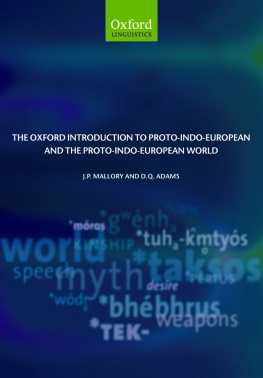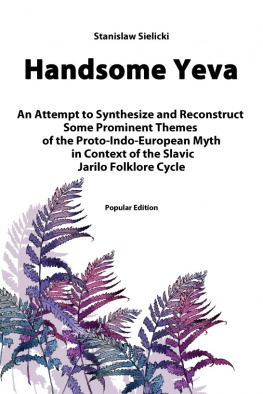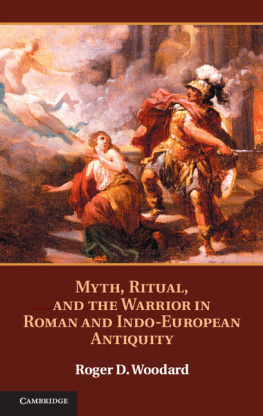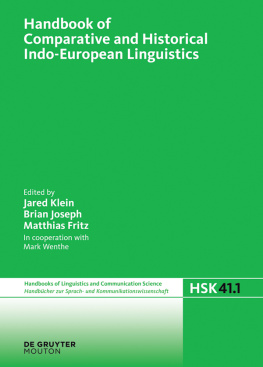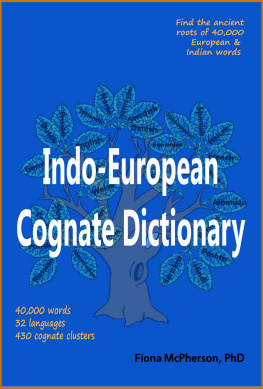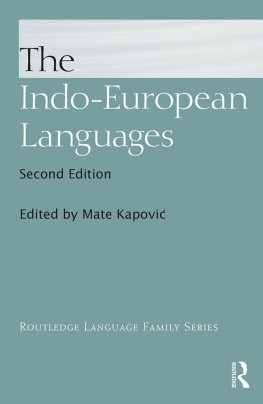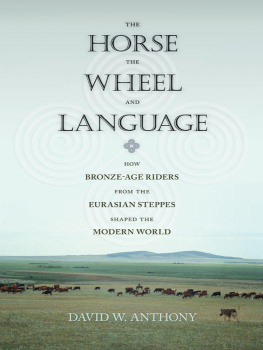(All dates are approximate) Alb = Albanian (16th century onwards). Arm = Armenian (5th century onwards). Av = Avestan, Iranian (1st millennium BC). Bakhtiari = a Southwest Iranian language (modern). Bret = Breton, Celtic (6th century AD onwards). Bulg = Bulgarian, a south Slavic language (11th century onwards).
Corn = Cornish, Celtic language of Cornwall. Cretan Grk = the variety of ancient Greek spoken on Crete. Czech = Czech, a western Slavic language (11th century onwards). Doric Grk = Doric Greek, one of the principal groups of the West Greek dialects. Gallo-Roman = the Latin spoken in Gaul after the Roman conquest. Gaul = Gaulish, a Continental Celtic language (3rd1st centuries BC).
Goth = Gothic, an eastern Germanic language (4th century AD). Grk = Greek (8th century BC onwards). HierLuv = Hieroglyphic Luvian, an Anatolian language (1300700 BC). Hit = Hittite, an Anatolian language (16501190 BC). Homeric Grk = the Greek dialect of the Homeric poems (800 BC). Ibero-Celtic = the variety of Celtic spoken in Iberia (3rd1st centuries BC).
Illyr = Illyrian. Ishkashmi = a Southeast Iranian language (modern). Kashmiri = Indic language of Kashmir (14th century onwards). Khot = Khotanese, an Eastern Iranian language (5th10th centuries AD). Khowar = Dardic/Northwestern Indic language (modern). Khufi = a Southeast Iranian language (modern).
Kurd = Kurdish, a North-west Iranian language (modern). Lat = Latin (7th century BC onwards). Latv = Latvian, Baltic (16th century onwards). Ligurian = presumably Celtic language of north Italy. Lith = Lithuanian, Baltic (18th century onwards). Luv = Luvian, Anatolian language (17th8th centuries BC).
Lyc = Lycian, Anatolian language of southwest Anatolia (6th4th centuries BC). Lyd = Lydian, Anatolian language of west central Anatolia (6th4th centuries BC). Maced = Macedonian, a language closely related to Greek. MDutch = West (Low) Germanic (c 1300 to 1500). ME = Middle English, Germanic (12th15th centuries). Messapic non-Italic language of southeast Italy (6th1st centuries BC).
MHG = Middle High German (AD 10501500). MIr = Middle Irish, Celtic (AD 9001200). Mitanni = Hurrian (non-IE) language of the upper Euphrates with elements of Indo-Aryan (15th14th centuries BC). MLG = Middle Low German (AD 10501350). MPers = Middle Persian, Southwestern Iranian (200 BCAD 700). MWels = Middle Welsh, Celtic (AD 12001500).
Myc = Mycenaean, earliest attested Greek (16th? 13th centuries BC). NDutch = modern Dutch, West Germanic (1500 onwards). NE = New (Modern) English, Germanic (1500 onwards). NHG = New High German, Germanic (1500 onwards). NIce = New Icelandic, North Germanic language (1400 onwards). NIr = New Irish, Celtic (1200 onwards).
Norw = Norwegian, North Germanic (1800 onwards). NPers = New Persian, Southwestern Iranian (8th century AD onwards). OBrit = Old British, Celtic (until 8th century AD). OCS = Old Church Slavonic, Slavic (9th13th centuries). OCzech = Old Czech, West Slavic (13th16th centuries). OE = Old English, Germanic (8001150).
OHG = Old High German, West Germanic (750 to 1050). OIr = Old Irish, Celtic (600 to 900). OLat = Old Latin (6th2nd centuries BC). OLith = Old Lithuanian, Baltic (16th18th centuries). ON = Old Norse, Germanic (11501550). OPers = Old Persian, Southwestern Iranian (6th5th centuries BC).
OPol = Old Polish, West Slavic (13th15th centuries). OPrus = Old Prussian, West Baltic (16th18th centuries). ORus = Old Russian, East Slavic (10501600). Osc = Oscan, Italic (5th1st centuries BC). Oss = Ossetic, Northeast Iranian (modern). OSwed = Old Swedish, North Germanic language (13th14th centuries).
OWels = Old Welsh, Celtic (9th12th centuries). Pal = Palaic, Anatolian (c. 16th century BC). Parth = Parthian, Northwest Iranian (3rd1st centuries BC). Pashto = Southeast Iranian (modern). Phryg = Phrygian (8th3rd centuries BC and 1st century AD).
PIE = Proto-Indo-European. Pol = Polish, Western Slavic (13th century onwards). Roshani = Southeast Iranian (modern). Runic = language of the earliest Germanic inscriptions (3rd6th centuries AD). Rus = Russian, East Slavic (c. 1050 AD onwards).
RusCS = Russian variety of Old Church Slavonic. Sanglechi = Southeast Iranian (modern). Sarikoli = Southeast Iranian (modern). SC = Serbo-Croatian, South Slavic (19th century onwards). SGael = Scots Gaelic, Celtic (13th century onwards). Scyth = Scythian, Iranian.
SerbCS = Serbian variety of Old Church Slavonic. Shughni = Southeast Iranian (modern). Skt = Sanskrit, Indo-Aryan (1000 BC onwards) Slov = Slovene, South Slavic (16th century onwards). Sogdian = Northeast Iranian (4th8th centuries). Swed = Swedish, North Germanic (15th century onwards). Thessalian Grk = classical Greek dialect of Thessaly.
Thrac = Thracian (5th century BC). TochA = Tocharian A (7th10th centuries AD). TochB = Tocharian B (5th13th centuries AD). Umb = Umbrian, Italic (3rd1st centuries BC). Waigali = Nuristani, Indo-Iranian (modern). AlbanianAlbanian [Alb]a, b, c, , d, e, , f, g, gj, h I, j, k, l, ll, m, n, nj, o, p, q, r, rr, s, sh, t, th, u, v, x, xh, y, z, zhaagonahaiajoariarrashtatathtballbarbardhbathebebebebejbibbiebindbletbreshrbrumebumbullitbungaldaldallojdaredarkdehdemderdergjemderrdetdimrdirsemdjathdjathtdjedjegdordradrakdritdrithdruduajdrushkdydytdhedhmbdhemjdhndrdhidhjesdhjetedhelbmblemrndndrrergjzethefarefjalfshijftohgrshasgjakgjallgjalpgjarprgjashtgjatgjejgjerbgjethgjizgjugjumgjyshgruagrurgurhahedhhnheqherdhehiehirrhypeminjjapjermjoshjukakallkapkatrkatrtkekkedhklyshkohkollkrifekrimbkripkryekurkushlablakurlaplapsllehlehtlndlngorlerliglodhetlopmadhmajmarrmatmbesmtomemekanmememzmimishmjekrmjelmjesditmollmosmotmuajmundmurgnatndndejndrndezndjeknduknenndnnengjelmtn-gjeshngrenguronnipnjnjnjernjzetnjinjohpapalparparzparzmpaspepelpr-dajpr-pjekpespestpipidhpishpjekpjellpjerdhplakplasplispresprushpunpushemputhqellqnjqethqojquajreshrirjeprrethrrjedhrrjepsassjellsorrsotsupsurmshshemrshishligshohshoshsh-pie

